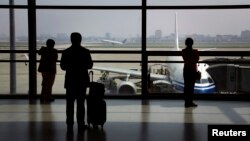China is responding coolly for now to an unusual blow against Chinese airlines from its political rival Taiwan .
On Friday, Taiwan’s Civil Aeronautics Administration froze applications from China Eastern and Xiamen Air to add a combined 176 flights during the Lunar New Year holiday next month. Both airlines are based in China.
The halt to those applications follows venting in Taipei over China’s unilateral launch January 4 of four new civilian aviation routes in the shared Taiwan Strait. Taiwan says the routes will let aircraft pass dangerously close to its own airspace.
Lack of added holiday flights will fluster mainly home-bound Taiwanese business people and the island’s tourism arrivals rather than Beijing itself, so China sees no need to retaliate right away, analysts say.
"I do not expect further escalation," said Lin Chong-pin, a strategic studies professor retired from Tamkang University in Taiwan."There’s no point of going further."
Still, the freezing of new flights jolts Beijing’s already tough bid to draw the Taiwan government of President Tsai Ing-wen into formal talks on the premise that both belong to a single country.
China and Taiwan have been separately ruled since the Chinese civil war of the 1940s, but China claims sovereignty over the island and insists on eventual unification. Opinion surveys show most Taiwanese oppose that goal.
Tsai rejects Beijing’s "one-China" condition for dialogue, which could be a possible conduit toward unification.
Act of defiance
Before angering Taiwan with its flight routes, China had needled the Tsai government by flying military aircraft near the island, scaling back tourism and letting two of Taipei’s diplomatic allies switch sides. China passed an aircraft carrier through the Taiwan Strait Jan. 17.
Tsai’s government of 20 months normally reacts to China’s pressure by accusing Beijing officials of setting back relations despite goodwill in Taipei. Freezing the flight applications is an unusually tough measure, analysts say.
The two sides opened direct flights in 2008 after six decades of hostilities to promote tourism and make it easier for China-based Taiwanese people to return home for the holiday that both sides celebrate. Chinese airlines had planned to add 509 flights during the two-week New Year period that starts Feb. 16 this year.
China wants to press Tsai into talks, which took place regularly under her Beijing-friendly predecessor of eight years, without angering people in Taiwan to where they elect leaders favoring Taiwan’s legal independence from Beijing.
China will avoid ramping up the flight dispute, for example, by rejecting applications from airlines or other companies in Taiwan, Lin said.
Taiwanese officials are catching heat now from Taiwanese investors who want smooth trips home for the holiday, meaning China itself need not retaliate, he added.
State-run media in Beijing accused Tsai of politicizing a commercial air route and on Friday its civil aviation administration expressed “condemnation” of the freeze in additional holiday flights.
A Chinese government-linked association of Taiwanese business people, about one million of whom live in China, also criticized Taipei's decision.
More of the same pressure
In the short term, expect China to continue its military maneuvers, said Shane Lee, a political scientist at Chang Jung Christian University in Taiwan.
"I think they would just continue even without this incident to fly the airplanes or send the warships around Taiwan island," Lee said.
The slow drain in Chinese tourism to Taiwan, a trend that peaked in 2015, will probably keep growing, said Nathan Liu, an international affairs professor at Ming Chuan University in Taiwan.
Longer term, China will keep squeezing Taiwan’s international space, Lee said. China already bars Taiwan from the United Nations and sub-agencies such as the World Health Organization.
Beijing’s diplomatic clout will ensure the U.N. International Civil Aviation Organization gives Taiwan no chance to appeal the four Chinese flight paths in the strait, said Joanna Lei, chief executive officer of the Chunghua 21st Century think tank in Taiwan.
"Taiwan will raise the noise, but probably would not get the decision reversed, and furthermore Taiwan’s international space will be further squeezed by a hard-line PRC," Lei said.
A softer hand?
Eventually China will rely more on softer means to bring Taiwan closer, part of its goal of unification, analysts say.
The Beijing government will add incentives to move younger Taiwanese into China for higher-paying jobs and more career choices compared to choices at home, Lin said. China had started enticing workers even before the civil aviation flap, he said.
Last year, for example, six Chinese provinces began accepting Taiwanese employees at local government-run institutions.
About 420,000 Taiwanese work in China now, according to the Taiwan government’s statistics agency.











